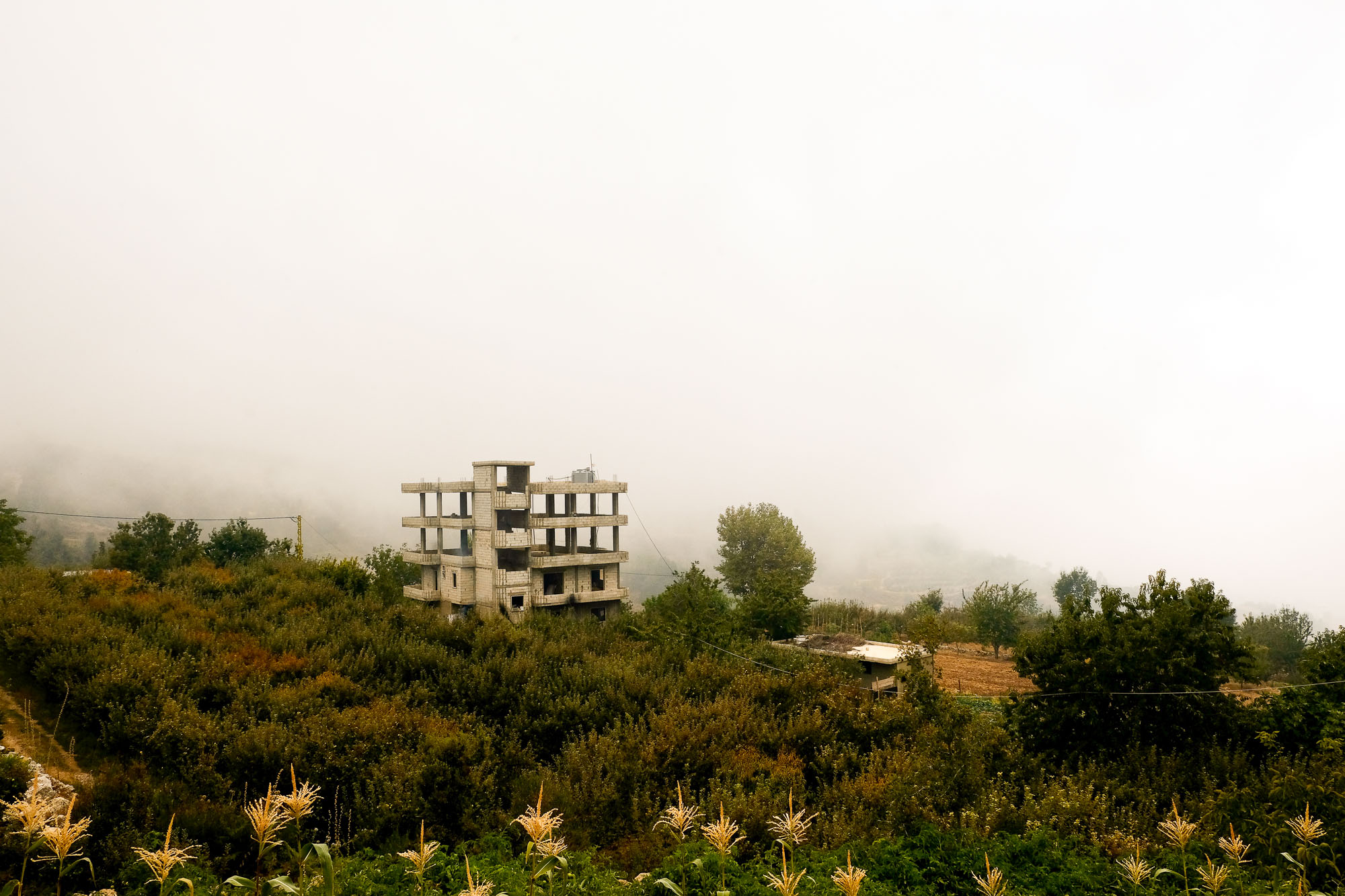APPLES IN THE MOUNTAINS
TEXT: JENNY GUSTAFSSON
PHOTOS: JENNY GUSTAFSSON
RESEARCH: ANGELA SAADE, YARA WARD
EDITS: NISREEN KAJ
Picking fruit with Hussein Naaman and his children

“This is the tastiest apple in the world according to me. It’s Double Red. I grafted it myself.”
Hussein Mohammad Naaman grabs an apple from a small tree on a land just off the road leading through Fnaidek, a town in the mountains of Akkar. The apple has a soft red peel and lands perfectly in his hand.
All around him are similar trees, with apples hanging from silver-brown branches. The sky is filled with clouds. It is a mild day in early fall, the perfect time to harvest apples.
Mohammad and Abdallah, Hussein’s two teenage sons, walk towards another tree, carrying empty black fruit boxes in their hands. Once they reach the tree, they start picking its lower hanging fruit, twisting each apple slightly to release it from the branch.
The land, inherited by Hussein from his father in 2004, has a typical use here in the mountains. Apples are the most cultivated fruit in Lebanon’s high-altitude regions and make up almost one-fifth of the total fruit-growing land in the country.

Hussein with his daughter Zeinab and youngest son Abdallah
As he walks through the grass, Hussein holds the hand of his five-year-old daughter, Zeinab. From time to time, she lets go of him, runs off to play among the trees, then comes back to his side.
His sons are soon done with the first box. Apple picking is not a very time-consuming endeavor. The youngest of the boys, Abdallah, grabs a branch and climbs up the small tree, to where he can reach the higher-hanging fruits.
This grove is one of several lands belonging to Hussein. He also has a bigger apple plantation and two plots with vegetables. He manages them himself, with the help of his children. On rare occasions, if major work is needed, he hires someone to help.
Hussein has been a farmer since he first got married, but things took a turn around five years ago. That is when he was approached by Mada, an NGO dedicated to sustainable agriculture. They provide trainings and advice, and support farmers with seeds and seedlings.
“They told me to test their methods on a small piece of land. I thought, ‘Let me do that and see what happens,’” Hussein says.
This is how he started with organic farming. At first, he converted a small piece of land used for the family’s own needs. When he saw that it worked, he continued with other plots. Two years later, he used organic methods on both of his vegetable lands.
“That’s how my father used to do it in the old days. He would not let any chemicals come near his lands at all,” Hussein says.
He walks towards the edge of the apple plantation, where a small but steep slope leads up to the road. He takes Zeinab in his arms and ascends to the top with a few quick steps. Behind him, at the end of the apple field, are Akkar’s green mountains.
Apples do well in this location. Fnaidek is at around 1,100 meters above the sea; a good altitude for apples, which can be planted higher than peaches, figs, and plums.
In fact, apples need the cold. They require extended periods of so-called “chill hours,” at temperatures below seven degrees, to stay dormant and prepare for blooming and producing sweet fruits each season.
Apples are the most grown fruit in Lebanon’s mountains
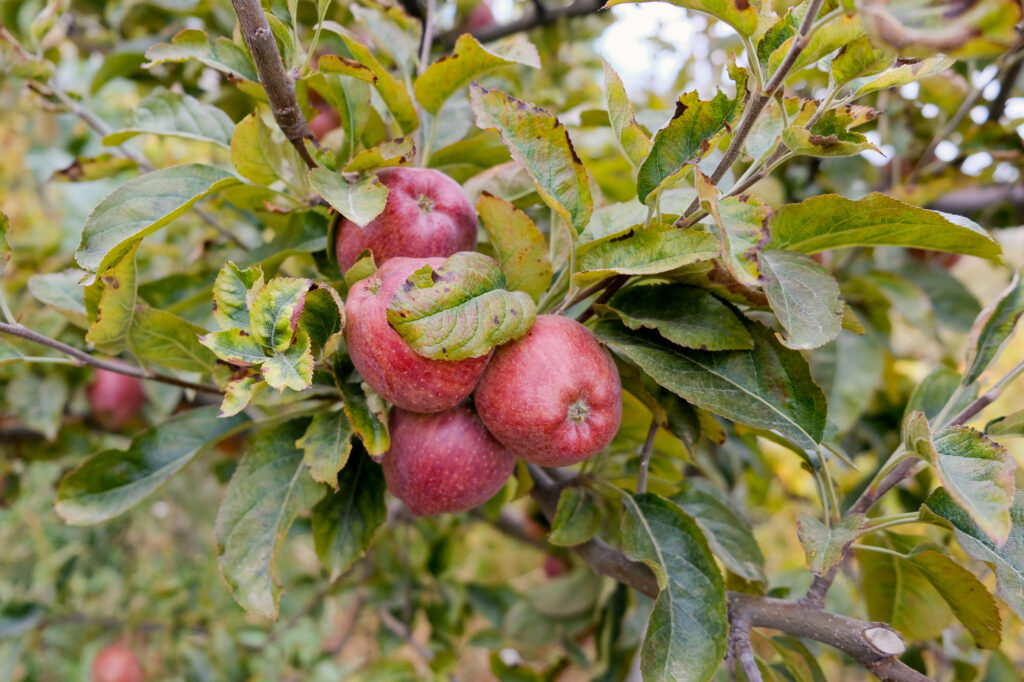
“Apples love cold weather,” Hussein says as he looks out over the grove.
Apples started booming in production after World War II and are now one of the most widely produced fruits in the world. Some 7,500 varieties are found worldwide, even though modern commercial production is heavily focused on a limited number of common varieties.
However, the origin of the fruit is found in the wild. The first apples in history grew in present-day China and Kazakhstan, some 10-20 million years ago. Wild apples still grow in these regions, on trees that can tower several stories high.
These original apples would vary from tree to tree, depending on what the bees brought from the buds. Mammals, when they discovered apples, began a process of selection. They discarded small and bitter fruits in favor of sweet apples, which made those seeds spread and, eventually, give way to new varieties. Horses in particular loved apples, and it was with them that apple seeds spread westwards on the Silk Road.
The Chinese (who probably were the first to experiment with grafting), Greeks, and Romans all played part in the spread of apples to new locations, as they brought seeds along on their endeavors.
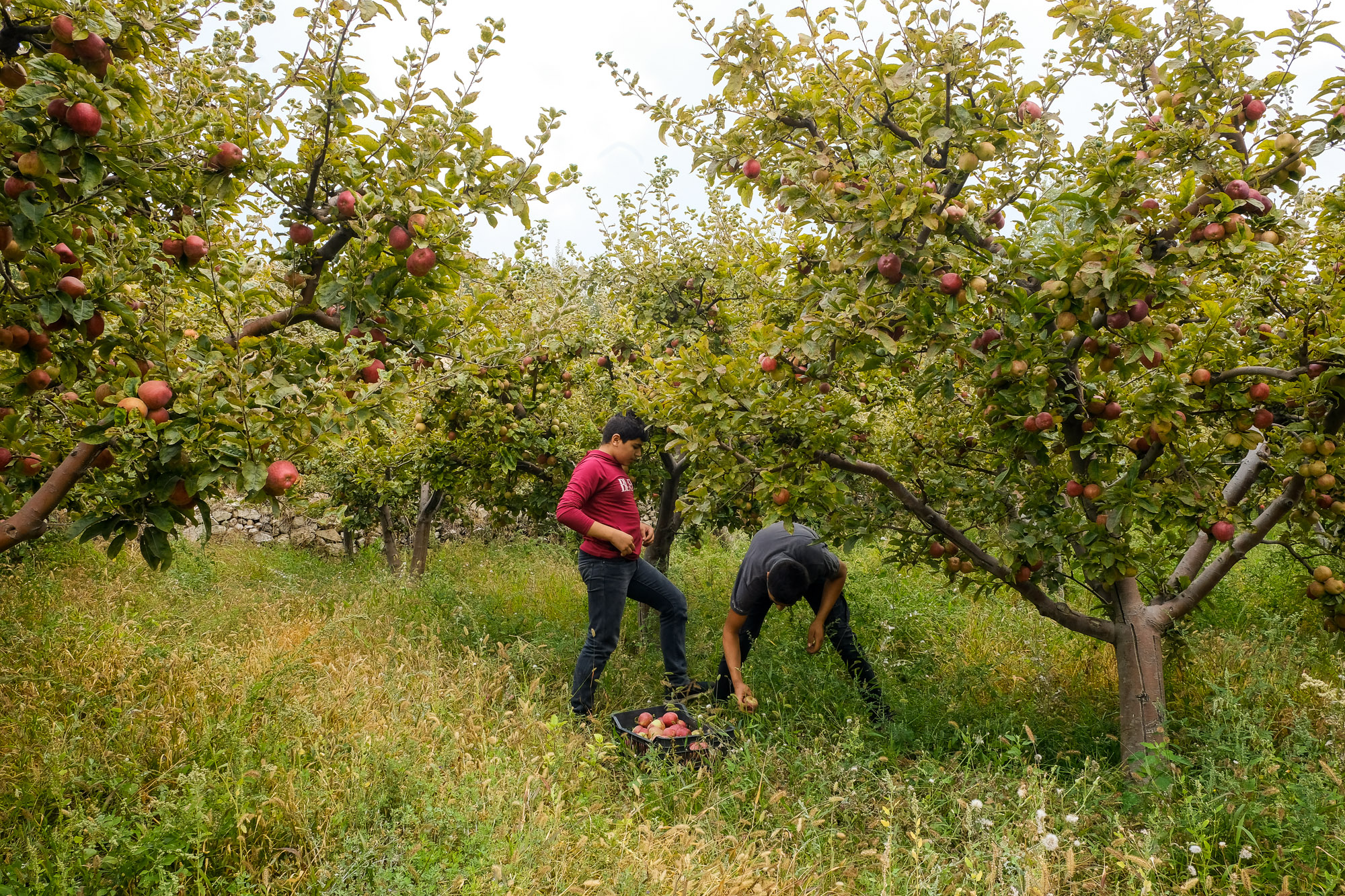
Hussein's sons harvest apples in the orchard
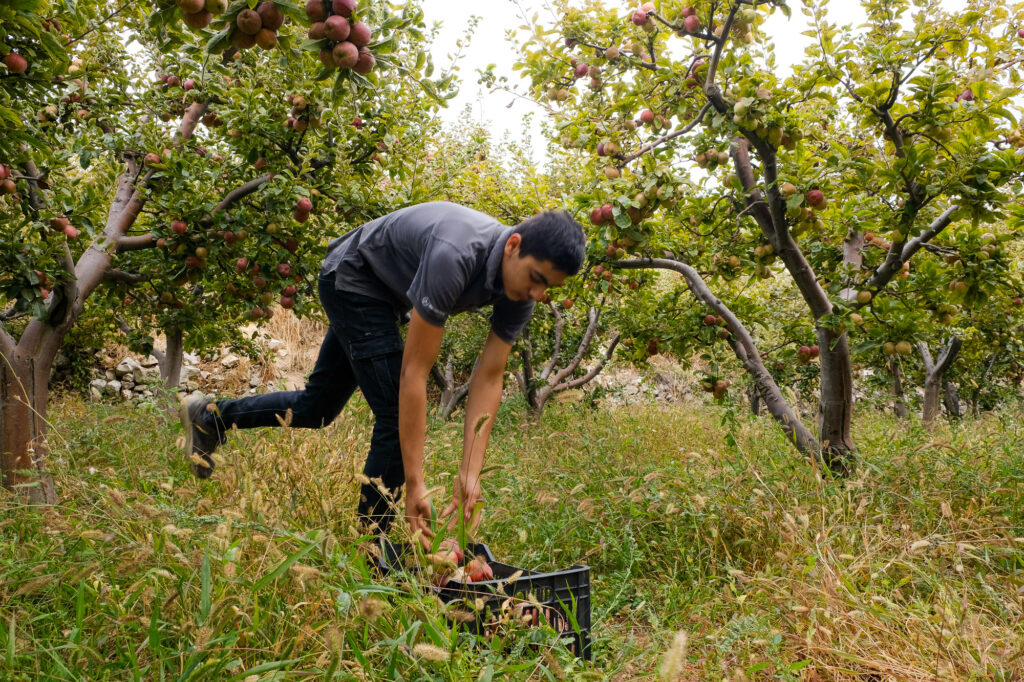
In Lebanon, where apples already grew in the wild, the first seeds of what would become a major industry were planted in the early 1900s. This was a time when the country’s silk industry saw its last days, and farmers needed to replace the no longer income-bringing mulberry trees with other crops. Agriculture saw a major redirection, from mainly peasant-based subsistence farming to what would become an industry geared towards export. Apples were one of several monocrops introduced as part of this shift.
A 1963 report published in Economic Geography says that Lebanon’s first private apple nursery was established in 1932 and its first commercial orchards in 1937, by a certain Mr Abdunnur and Mr Pharaon. According to the article, they learned about apples “through contacts with returning emigrants and through familiarity with trade journals.”
The early plantations were all near main roads, in the Chouf and the mountains above Tripoli and Beirut. One of the pioneering projects, which attracted attention since it was located “in full view” of the Beirut-Damascus highway, was an orchard at Mdejrej.
The export philosophy guided things from the very beginning. Lebanon, rich in water, was seen as the ideal source of fruit to countries in the region, not least the Gulf states. Apple and Citrus Offices were established (replaced in 1959 by a common Fruit Board) and production expanded. From 1939 to 1959, the total area for growing apples grew from 327 to 10,953 hectares. The author of the 1963 report calls it a “planting boom.” In the 1960s, apples were the second export crop after citrus.
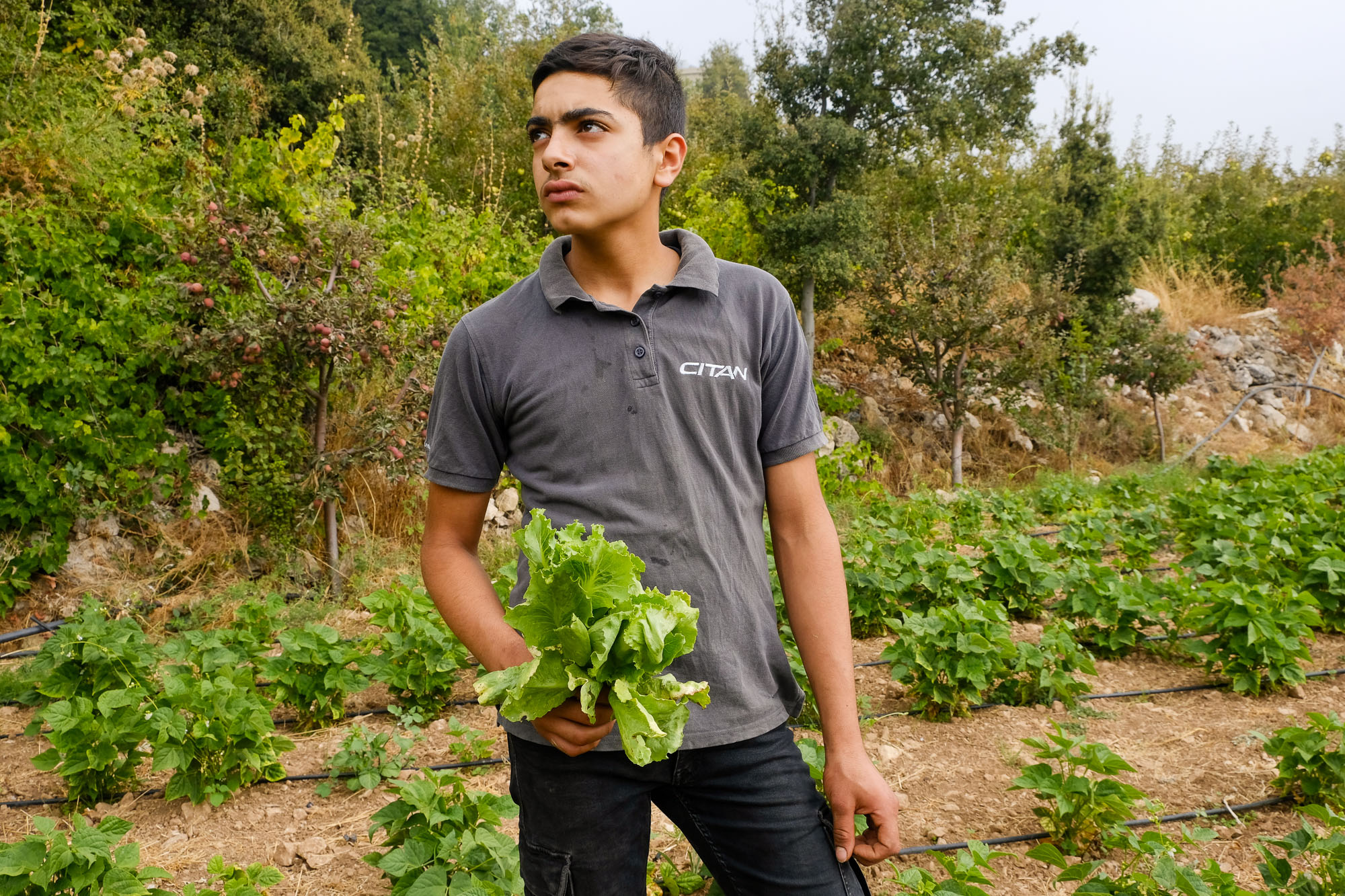
Mohammad, Hussein’s 15-year-old son, quickly fills a box with tomatoes
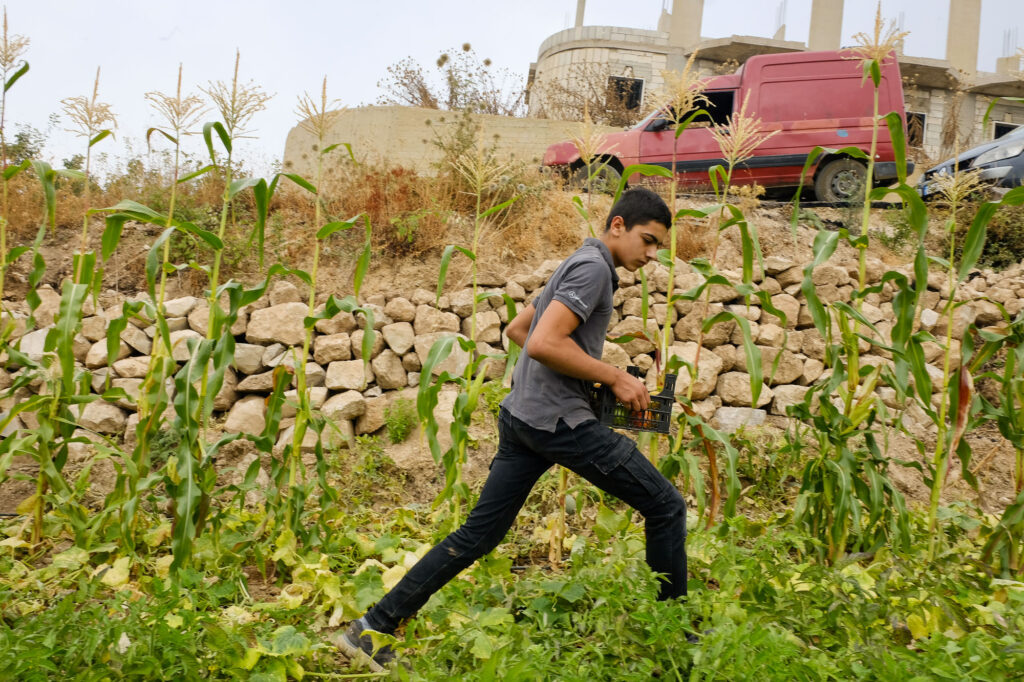
Lebanon’s mountain agriculture, which historically had been a function of self-sufficiency, was particularly impacted. Besides a variety of vegetables planted for local consumption, the main crops had been olives and wheat; now, these were replaced by fruit trees. While 39 percent of the land was dedicated to cereals in 1961, the number went down to 20 percent by 1999.
This took place during an era of big water infrastructure projects being implemented in the country, as part of French Mandate policies guided by the idea that “any drop of water going to the sea was lost.” Irrigation systems were expanded, in part to secure self-sufficiency, but also to support export production. Looking back, it came with major environmental consequences, as more water is required than for rain-fed agriculture. The shift also benefited already powerful farmers at the expense of those with traditional know-how.
Today, Hussein and others in Akkar continue to face issues with water. Earlier, Hussein says, he was able to get enough water from rivers in the jurd, a nearby high-altitude land, which supplied farmers in the area through a system of canals.
“We used to organize so that everyone got water for an hour at the time. But there’s less water now and more people are planting. And the warmer weather means that the trees need more water,” he says.
To solve this, he pumps water for his trees. But it is costly, since the price of fuel to run the pump is high.
Hussein and the children get into the car, which is parked next to the apple grove, and head to a vegetable land not far from the plantation. Here, he plants melons, tomatoes, cabbage, cucumbers, haricots verts, and several other crops. He also has some wheat, from which he gets bulgur and hay that he can sell.
“During summer, we don’t buy anything. If we want to make fattoush, for example, we get all the ingredients from the land,” he says.
Since starting with organic farming, his costs are lower – but he needs to devote more work than if he was spraying his lands with chemicals.
“If I need to remove weeds, for example, I can either do it by hand but then it takes two days for two people. Or I spray and everything is gone in five minutes,” he says.
When they get out of the car, Mohammad, the oldest son, grabs a box and starts picking tomatoes. The ground is covered with plants, heavy with orange and light-yellow tomatoes. He moves quickly from plant to plant, selecting the ripe ones.
Most of Hussein’s produce is sold at the wholesale market in Akkar, one of seven large and two small wholesale markets in Lebanon. But there are many issues at these markets. Producers describe problems such as arbitrary pricing, lack of transparency, and informal agreements that put them in a weak bargaining position, such as a 10 percent commission.
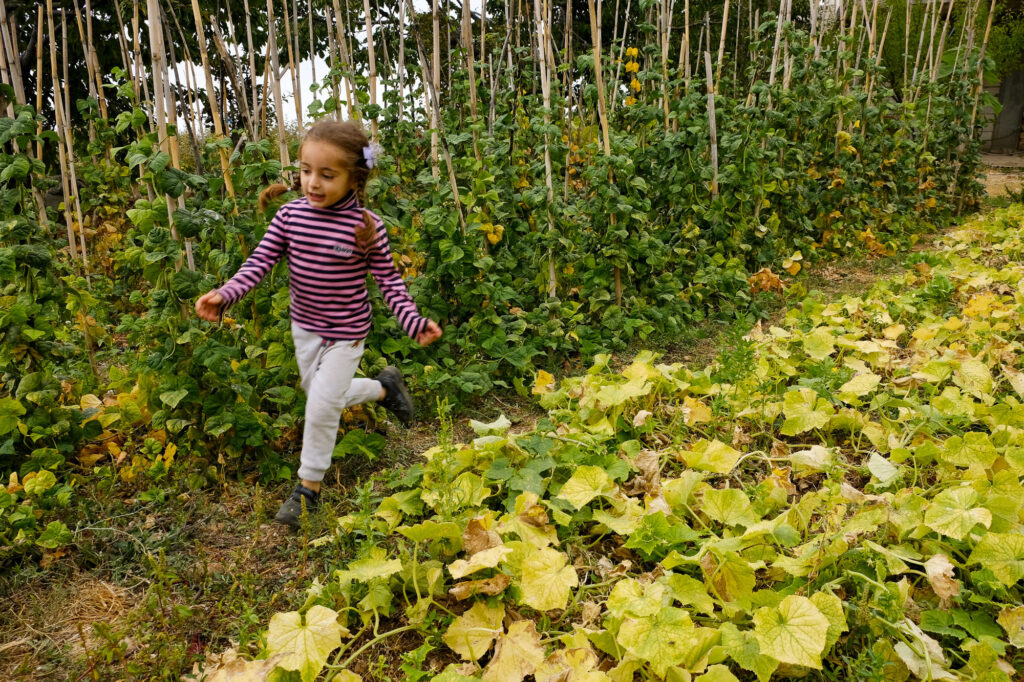
Zeinab, who is five years old this year, runs through the vegetable land
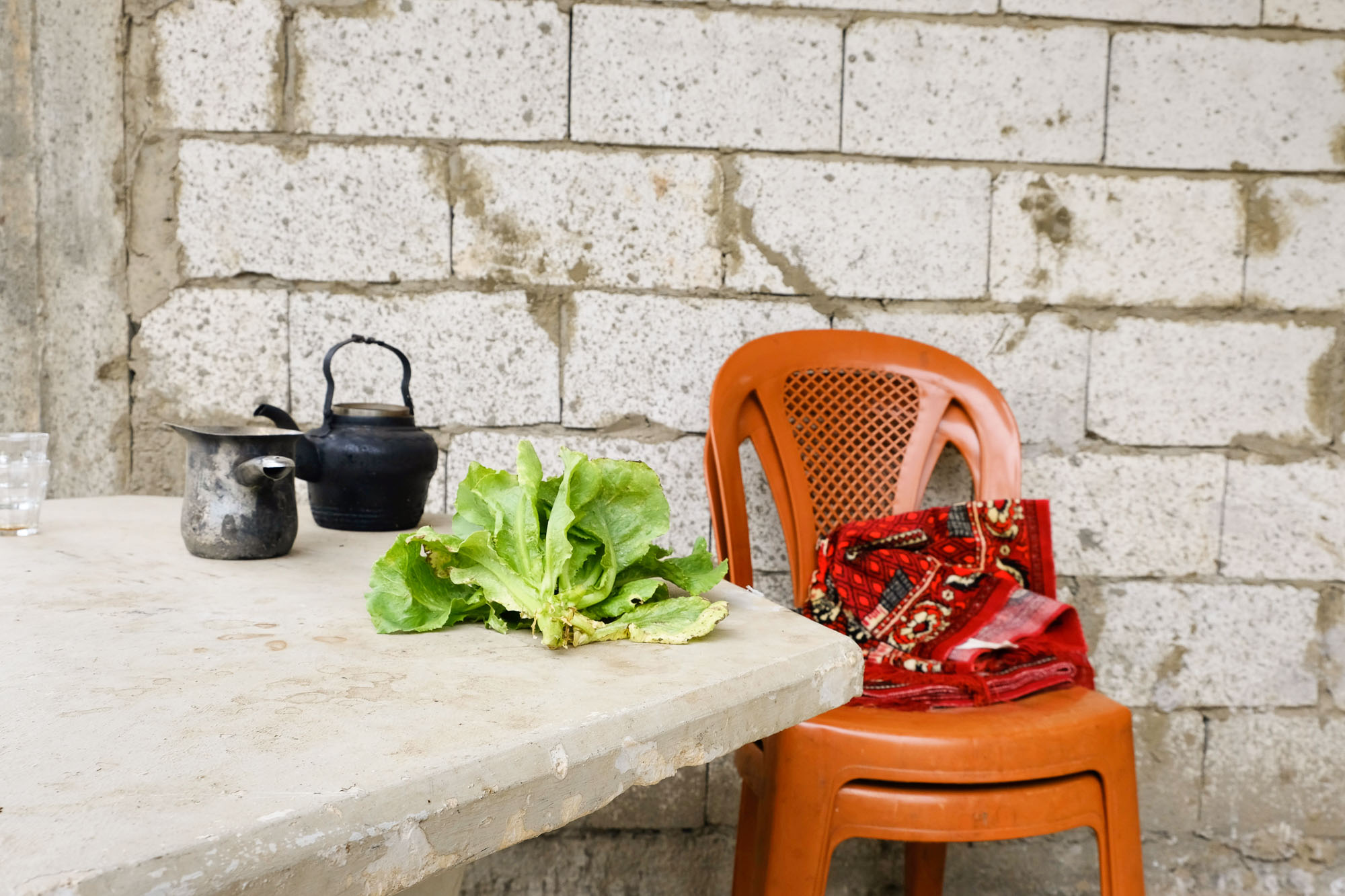
“The traders meet in the morning and decide how much they will pay for a kilo of tomatoes, for example,” says Ghassan Saoud, a farmer who grows vegetables in Akkar and was interviewed about selling his produce in the market.
Often, Ghassan says, traders at the market pay as little as a tenth of the selling price. Several producers also say that traders at the wholesale market provide receipts with lower prices than what the produce was sold for.
“Whoever takes my products, I will sell them,” says Nicolas Madani, an apple grower in Bmahray who was also interviewed.
“I always worry about selling my fruit,” he says.
Hussein says the pricing of apples is very arbitrary. One year, the fruit sells for $4-5 per box, another year for only $2. He sells his organic fruit and vegetables for the same price as conventional produce, since there is no market in the north for organic production. Akkar is an isolated region in Lebanon and, together with the Bekaa, the most impoverished area in the country.
“At least my consciousness is at peace because I know I am selling good produce,” Hussein says.
Sometimes Mada brings his produce down to Beirut and sells it there.
“That is great because if the market price for a crop is, say, 15,000 lira, Mada gives me that amount plus an additional 25 percent,” Hussein says.
The past couple of years have been hard for Lebanon’s apple producers. In 2016, the industry was thrown into crisis when the border with Syria, through which a major share of the exports go, closed. Prices plunged, farmers found themselves with a lot of surplus fruit, and many ended up not even harvesting their apples. Across the country, people went out to protest and block roads.
Some private companies distributed fruit for free. In Tripoli, Abdul Rahman Hallab & Sons 1881 added apple maamoul, apple baklava, and knefeh with apple to their menu. The Lebanese government even suggested that NGOs working with Syrian families could buy and distribute surplus apples.
But no real long-term solutions were found. Lebanon still depends on exports for its apple production, which is roughly double the size of the domestic demand. In 2021, when Saudi Arabia banned Lebanese fruits after finding drugs smuggled in pomegranate boxes, the industry was dealt another blow.
After peaking at 207,850 in 2016, annual apple exports went down to 170,000 tons in 2022.
A Blom Bank report named 2016 the year when Lebanese apples were “dethroned” as the king of fruit.
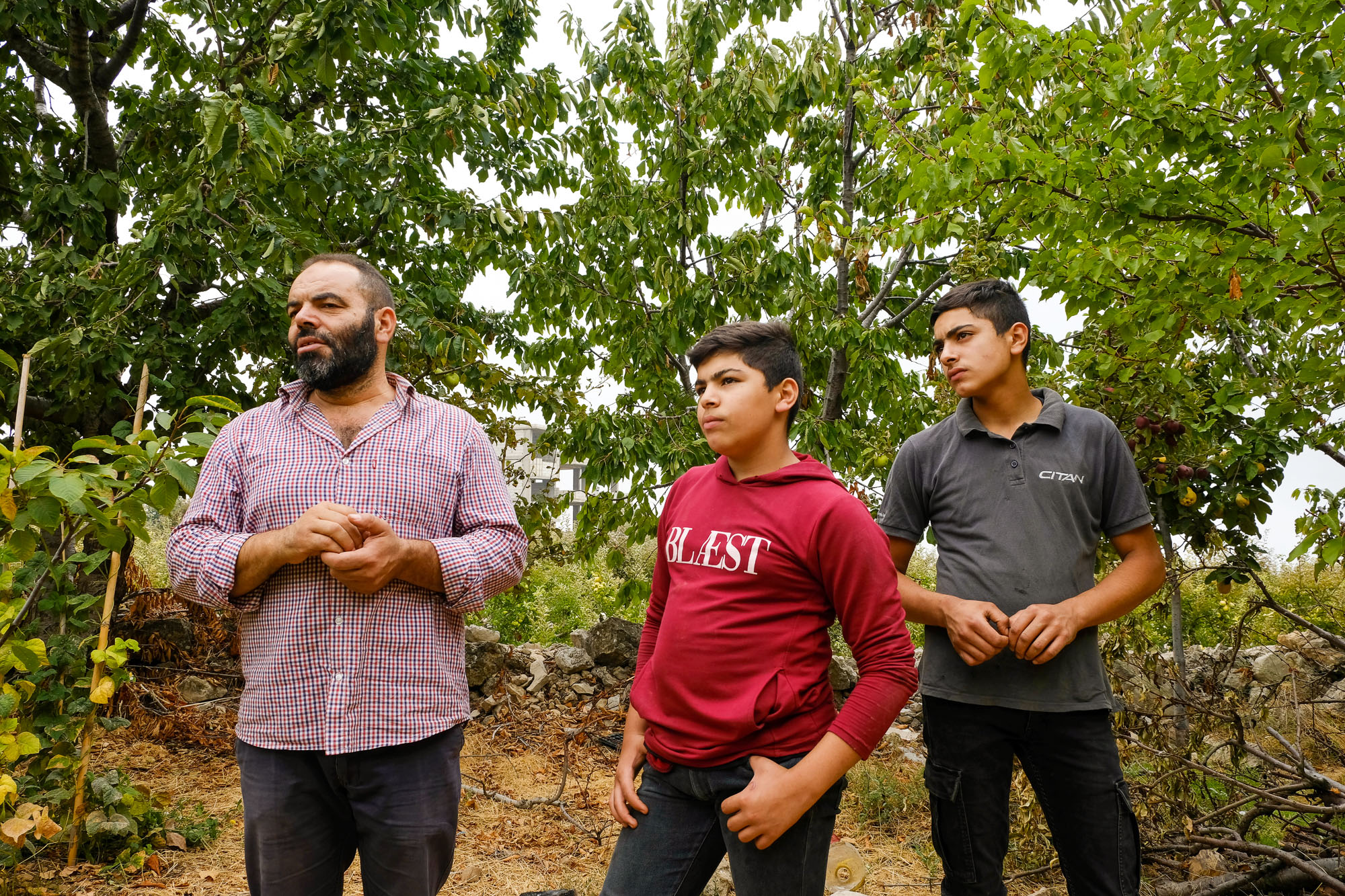
Hussein is often joined in the fields by his sons Abdallah and Mohammad
The idea of apples occupying the royal throne goes far back. In several languages, including Greek, French, and Latin, the word “apple” used to refer to any kind of fruit. Until the 17th century, the generic Old English term even included nuts. Many modern fruit names still bear the name: custard apple, star apple (a tropical jelly-like fruit), and pineapple. In French, potatoes are pommes de terre, literally “apples from the ground.”
Apples in folklore and mythology often symbolize beauty, health, and, as the resurrected Snow White discovered, immortality.
In 1966, Yoko Ono placed a single Granny Smith apple on a stand at a London exhibition. A visitor picked it up and bit into it. It was John Lennon: this was the beginning of their love story. Two years later, the Granny Smith reappeared in the logo for The Beatles’ Apple Records.
Steve Jobs was fond of apples, too. It is said that he decided on the name Apple when on a temporary fruitarian diet. And the company’s iconic Macintosh product line was named after project creator Jef Raskin’s favorite apple variety.
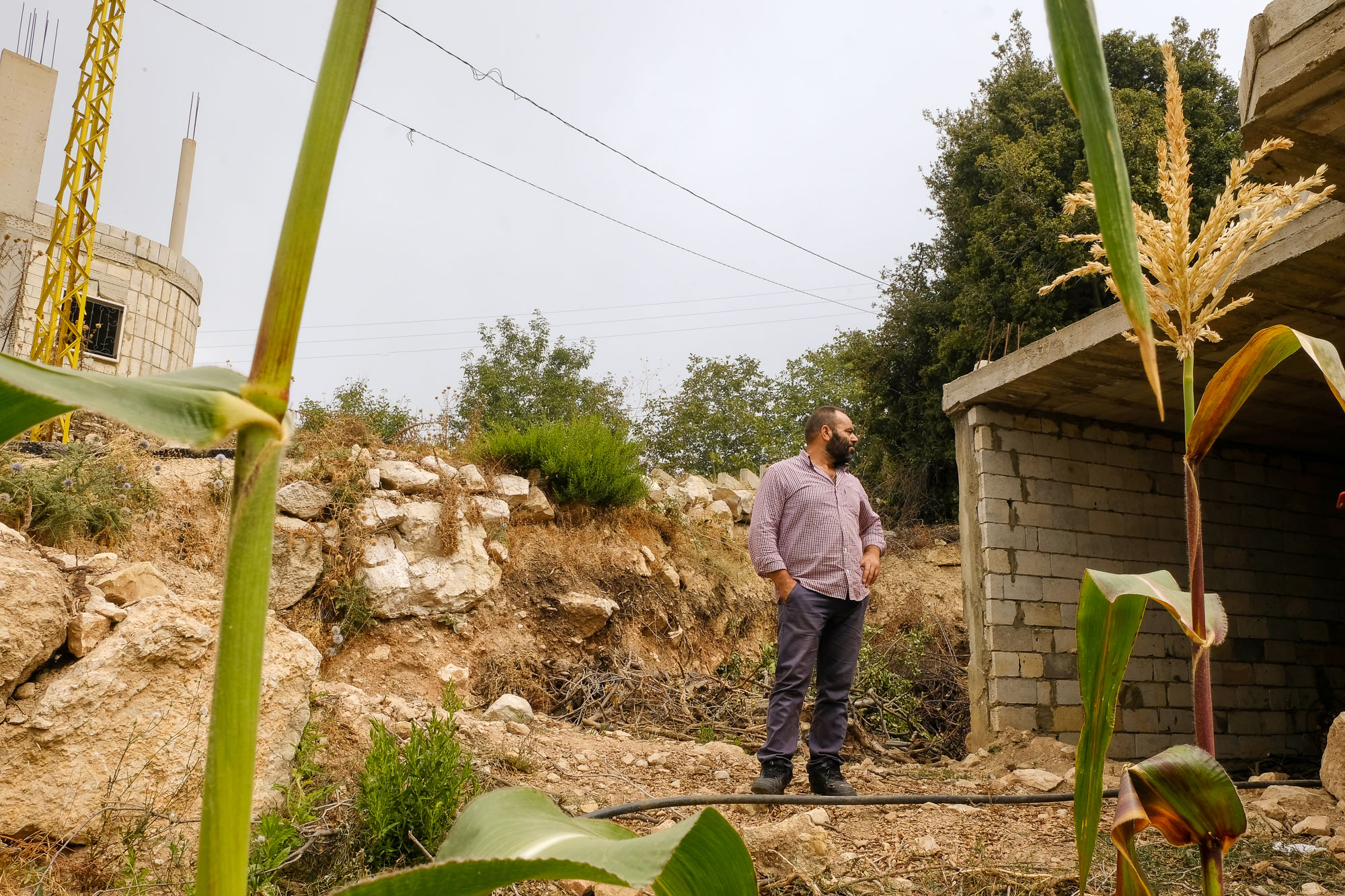
Today, while some 40,000 apple names are registered globally, varieties like Red Delicious, Gala, and Golden Delicious (all offsprings of the same breed) occupy many grocery shelves.
Standardization in fruit growing, and the search for high-yielding trees that require little care, has made many old varieties fall into oblivion. In Lebanon, Red Delicious and Golden Delicious, the same varieties that were planted by the first farmers almost one hundred years ago, remain the most common. Other varieties are Gala, Super Chief, or Sans Pareille, known as mouwashah in Arabic. Wild apples can also be found in places like Ehden, Bcharre, and Ain Zhalta.
As he reaches the shop, he opens the blue doors and steps inside. On the floor are boxes filled with pomegranates and big, white grapes. A kid comes in with a few bills in his hand and starts eyeing the shelves with snacks.
Hussein and his family manage to live mainly from their land, even though it is challenging. The school fees, he says, have gone up from $150 to $400 per child. So, they decided to send only Zeinab to a private school and have the boys study in the government system.
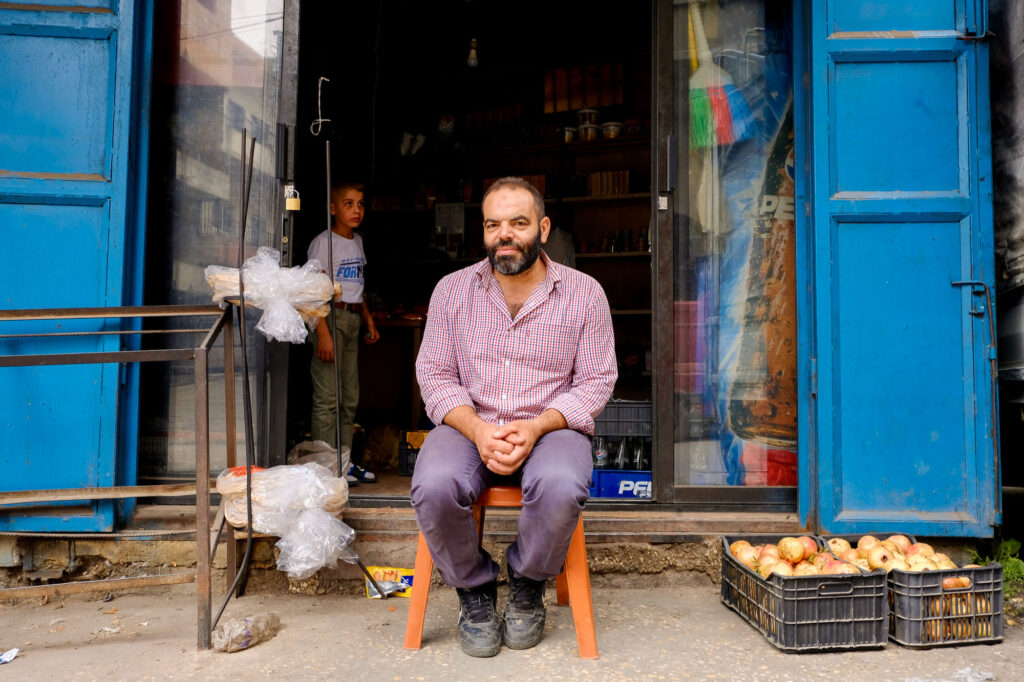
“After I started selling my crops in my shop in the village, people began to know me and my vegetables.”
They find other ways to adapt as well.
“We used to freeze our haricots verts, but there’s no electricity for the freezer now. So, we sun dry them on the roof instead, like in the old days,” Hussein says.
He takes a stool and sits down outside the shop. Cars pass by, either going up the mountains or down towards the coast. In front of him is the small road leading up to the apple grove and vegetable lands.
“I love the land. If I don’t go there often, I cannot live. Even in winter, in the snow, I go to the land every day,” Hussein says.
